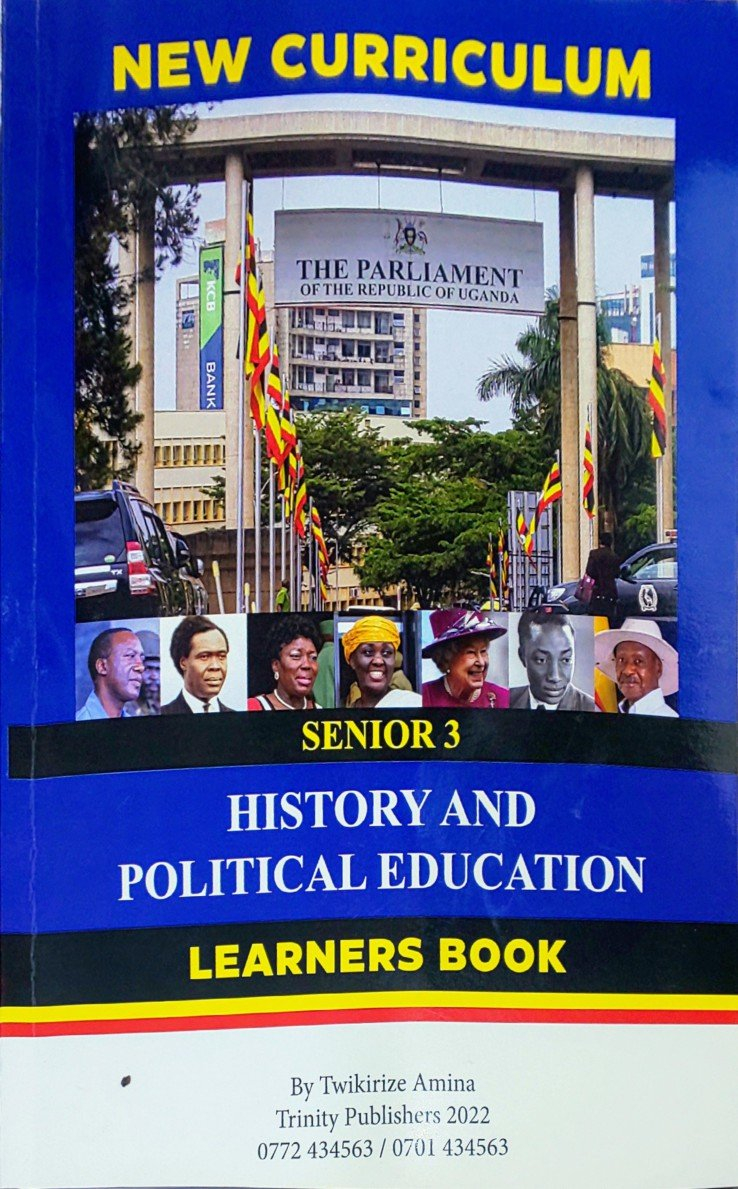28
LSC S1: SENIOR ONE HISTORY AND POLITICAL EDUCATION History and Political Education Learner’s Book One has been written in line …
LSC S1: SENIOR ONE HISTORY AND POLITICAL EDUCATION
History and Political Education Learner's Book One has been written in line with the revised syllabus, which came into effect following the roll out of the New Lower Secondary Curriculum by the National Curriculum Development Centre (NCOC) in 2020.
Anwng the subjects on the menu is History and Political Education. The rationalefor its teaching and learning is that it is key to the development of good citizens. It enable learners explore the past of their locality and the wider world. They will find out key events and people who have shaped our history and the world
tcxiay. The learners will also learn to analyze and explain reasons and results ofi historical events, situations and changes over the periods studied. It caters for critical thinking skills in order to help the learner look beyond headlines.. It also trains the mind and teaches you how to think and process information. It
provides a basis for research and inquiry into the past so as to learn from it andhighlights the importance of politics in development. cn
content and activities in this book will enable you acquire knowledge and
generic skills that will lay a foundation to pursue a career in History and Political Education and related fields,
information in this book is adequate, accurate, clear and appropriate to enable you acquire the required competences. This book has a wide range of relevant and vivid illustrations that depict real-life situations, which are aimed at making learning interesting.
Course Currilcum
- LSC S1: RESPONSE TO THE ESTABLISHMENT OF COLONIAL RULE IN EAST AFRICA Details 11 months, 3 weeks
- After studying this chapter, you will be able to understand how the East African communities reacted against colonial rule in primary and secondary response. In the previous chapters, we studied the reasons for the coming of Europeans to East Africa, and how East Africa was partitioned among European nations without consulting Africans. In this chapter, you will be able to understand how East Africans responded to colonial rule you will know how different factors
- LSC S1: SCRAMBLE, PARTITION AND COLONIZATION OF EAST AFRICA Details 11 months, 3 weeks
- Introduction After studying this chapter, you will be able to understand the causes, methods and impacts of colonisation of East Africa. You recall in the previous two chapters that the productive potential of the East African region was exposed to the world through missionary work and Long Distance Trade. The exploitation of the interior resources in the Long Distance Trade paved the way for the need to control these
- LSC S2: EAST AFRICAN LONG DISTANCE TRADE Details 11 months, 3 weeks
- Introduction After studying this chapter, you will be able to understand Long Distance Trade as a concept and how it was carried out in the pre-colonial time and its organisation in East Africa. You will be able to appreciate the contribution of the trade that existed to the history of East Africa. You will be able to understand and appreciate how the trading system has continued to influence trade and commerce in East Africa today.
- LSC S1: MIGRATION AND SETTLEMENT INTO EAST AFRICA SINCE 1000 AD Details 11 months, 3 weeks
- Introduction In the previous chapter, you studied about the origin of a man and theories about the origin of man. You noted that man did not stay in ono but kept moving from one place to another because or the environment, After studying this chapter, you will be able to understand the origins or your own families as a result of migration and settlement of people in East Africa today. You Will
- LSC S2 :RELIGION IN EAST AFRICA Details 11 months, 3 weeks
- Introduction After studying this chapter, you will be able to understand the influence and the impact of religions in East Africa. You will be able to understand and appreciate that before the coming of foreign religions, East Africans had their own way of worshipping God. You will also appreciate the reasons why African religions existed alongside foreign religions. You will be able to analyse the impact of foreign religions on the indigenous people of East Africa. Religion is a belief in a god or gods and the activities that are connected with this belief, such as praying or worshipping in a building such as a church, temple or a mosque. It is a belief in and worship of the superhuman controlling power and worshipping a set of beliefs concerning the cause, nature, and purpose of the universe. It usually involves devotional and ritual observances, and often contains a moral code governing the conduct of human affairs.
- LSC S2: STATE FORMATION IN EAST AFRICA Details 11 months, 3 weeks
- Introduction After studying this chapter, you will be able to appreciate the organisation of the centralised and the non-centralised states in East Africa, and how they contribute to governance systems and structure in the modern times. You will appreciate the development of centralized states in a situation where they did not exist, and what contributed to the existence of those states. You will also be able to differentiate between the centralised and non-centralized governance systems in provision of services and welfare to people.
- LSC S1: CULTURE AND KEY ETHNIC GROUPS IN EAST AFRICA Details 11 months, 3 weeks
- After studying this chapter, you will be able to understand culture as a concept , and people's relations in East Africa. The study of migrations introduced you to causes and effects of migrations in East Africa. One of the effects was introduction or adaptation of new cultures as people moved and settled in different areas
- LSC S1: MIGRATION AND SETTLEMENT INTO EAST AFRICA SINCE 1000 AD Details 11 months, 3 weeks
- Introduction In the previous chapter, you studied about the origin of a man and theories about the origin of man. You noted that man did not stay in ono but kept moving from one place to another because or the environment, After studying this chapter, you will be able to understand the origins or your own families as a result of migration and settlement of people in East Africa today. You Will
- THE ORIGIN OF MAN Details 11 months, 3 weeks
- Introduction After studying this chapter, you will be able to understand the different views Yom different studies about the origin of man. You will be able to understand the growth and development of human beings in terms of who we are, what we do, and where we fit in as humans. This will be based on the various theories that have been advanced. The knowledge got from this chapter will 9tve you an idea of the evolution of culture and society. It will also help you understand how we came to be so diverse from fairly primitive beings.
- LSC S1: UNDERSTANDING OUR PAST Details 11 months, 3 weeks
- After studying this chapter, you will be able to understand the different methods finding out about our past and appreciate the importance of historical sites. The subject will help you to understand and appreciate the meaning of history how it contributes understanding ourselves and the people or places around us.


